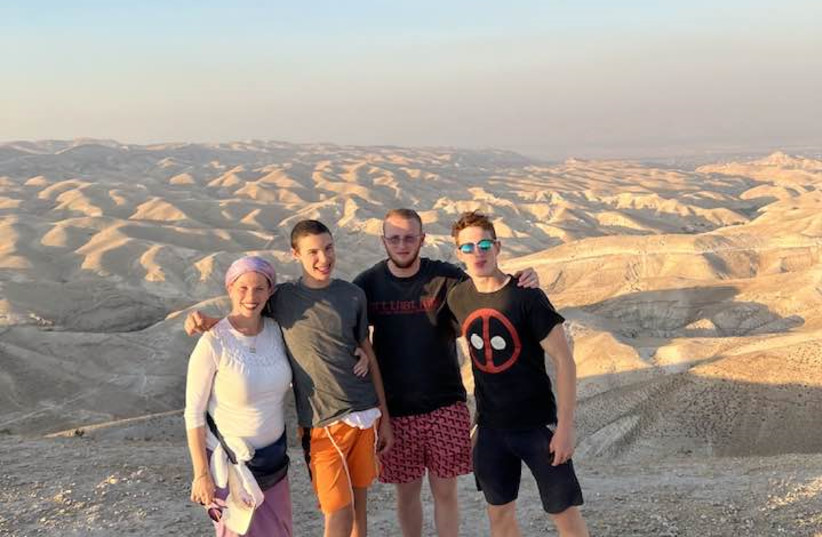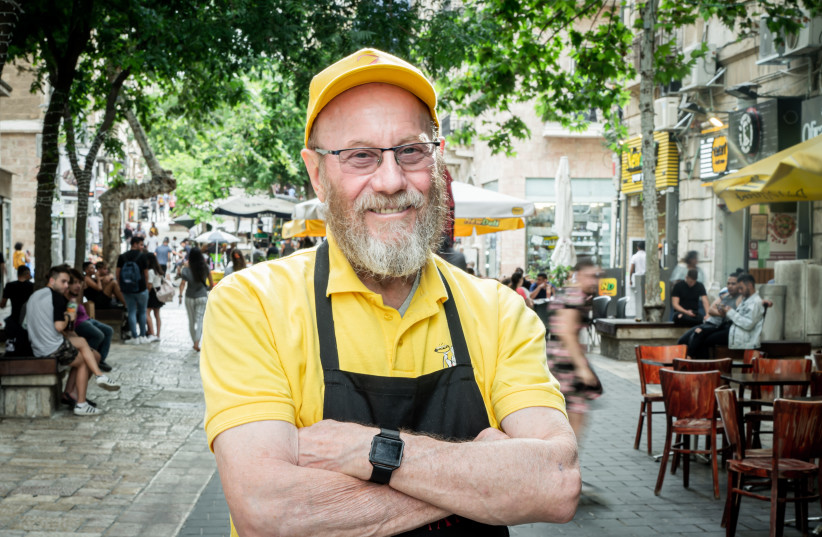While Israel’s borders were closed to non-citizens during the pandemic, Israelis experienced a surreal sense of loss, as the country that thrives on tourism shrank by hundreds of thousands of visitors each month.
Previously ubiquitous tour buses were no longer seen on Israel’s highways and city streets. Many tourist attractions were deserted or completely locked up. The rare flights to Ben-Gurion from abroad were so empty that passengers could claim entire rows for themselves. And for olim relying on visiting friends and relatives to bring treats from the Old Country, the sense of loss was compounded as their supplies of Crystal Light and Marmite Crisps ran dry.
The following numbers will give you a sense of the impact of the COVID-related closures on the tourism industry. In July 2019, shortly before COVID began to wreak havoc on the entire world, Israel welcomed 323,000 visitors. The Tourism Ministry recently reported that in July 2022, tourism was still down almost 25% from 2019 levels.
Thousands of businesses are based on tourism to Israel. We spoke with seven business owners in the tourism industry to find out how the COVID-related downs and ups of Israeli tourism impacted them.
One thing is certain. The COVID closures didn’t treat everyone the same. As you’ll see, some businesses were decimated, some held their own, some are beginning to come back, and some are stronger than ever.

Tour guide
“My entire business, all 100% of it, was focused on incoming tourism, people visiting from abroad,” licensed tour guide Hanoch Young said. “I guided across [Israel], either with full-blown group tours or individuals and couples. I had more business scheduled for 2020 than in the previous three years together. It all ended on March 5, 2020, which was the last day that I worked before Israel shut down to tourists.
“My entire business, all 100% of it, was focused on incoming tourism, people visiting from abroad. I guided across [Israel], either with full-blown group tours or individuals and couples. I had more business scheduled for 2020 than in the previous three years together. It all ended on March 5, 2020, which was the last day that I worked before Israel shut down to tourists.”
Hanoch Young
“After the initial shock, and after realizing that the COVID nightmare wasn’t going to end anytime soon, I tried to switch to lectures and teaching online.”
Young’s foray into working online quickly failed due to Zoom fatigue. “Most of my constituency quickly tired of basing their lives around Zoom, which they were already using for work and, in many cases, their religious congregational connections,” he shared. “After a few attempts, I just gave up on it.”
Young called the COVID period “my worst nightmare come true. In previous years, whenever there was a conflict and people canceled their trips [to Israel], I was at least able to travel abroad to lecture to congregations and groups and earn something. During most of the two years of COVID, I didn’t feel comfortable traveling abroad.” He did make one trip in January 2022, “and that was out of desperation,” he said.
Young was disappointed with the government’s lack of support for those in the tourism industry whose livelihoods were directly impacted by the closures. “The government stopped providing even minimal aid to tour guides in 2021. As late as December 2021, Finance Minister Avigdor Liberman announced that ‘If you’re a tour guide, you should find another profession.’
“The financial effects of not being able to work for two years have been absolutely devastating,” he confessed. “I have no idea how many years it will take to recoup those losses.”
Young hopes that by December 2023, tourism will return to 2019 levels. In the meantime, he is gradually rebuilding his guiding business.
“Within a few weeks of [Israel’s] reopening on March 1, I was able to begin working once again. However, it has primarily been business based on group tours with day tourists as opposed to the far more personally satisfying and financially helpful group tours of 10+ days,” he said.
“To date, only one of my groups that had been scheduled in 2020-21 has actually come to Israel. I have even returned to guiding part time in the Kotel Tunnels as I work to regrow and restart my guiding business.
“As the saying goes: ‘All beginnings are difficult.’ Guiding is what I do. I have no side-hustle. I believe that Hashem [God] placed me on this Earth to be a tour guide,” he reflected.
ARKY STAIMAN built his tour business, Israel with Arky, by offering “day trips for families looking for an unforgettable day, combining learning and fun, to get the whole family to fall in love with Israel.” He shared that his business, which is based in Jerusalem, was 98% reliant on tourists.
During the COVID closures, “my regular business was totally shut down, so I pivoted to [trips for] Israeli Anglos. For teens, I offered a water hiking camp experience in the summer and unforgettable water hike adventure bar mitzvah tiyulim [tours]. I then focused on tours for new olim who haven’t had the chance to explore their country, during days off from school.”
The Staiman family survived on the income from these alternative adventures and that of his wife. Since she was an essential worker and the family had two young children, “there were a lot of wonderful and challenging ‘daddy day care’ days. I also started learning and mastering personal finances to be able to help people with basic financial coaching services. This was more of a hobby to help people and not out of a desire to make money,” he said.
When tourists returned to Israel, Staiman was more than ready to pick up where he left off. “Business has come back stronger than ever before. I am praying and hoping that it’s not just a single wave of those who were waiting to come, but rather a sign of better times for Israeli tourism,” he commented.
SHELLEY BRINN runs a local tour company called Tour Adumim. Pre-COVID, her company “coordinated activities in the Ma’ale Adumim region, as well as provided original educational programs for families and larger groups,” she said, adding that it was “coordinating approximately 100 groups a year at different venues in the region.” Brinn estimates that 80% of her clients were tourists from abroad and just 20% of her business was from locals.
During COVID, Brinn completely shut down Tour Adumim. “The business was not operational, as there were no tourists,” she reported. Instead, she took a job as a content writer for a start-up in Jerusalem, “totally based on the fact that [Tour Adumim] couldn’t operate.”
Once the borders reopened, Brinn “went down to half time at the content writing job.” She estimated that, based on the bookings for Summer 2022, “business has almost returned to pre-COVID levels.”

Christian tourism
Donna Jollay, owner of the Columbus, Ohio-based Jerusalem Tours, said that for 40 years, her company has “provided group tour adventures to the Holy Land. As you can see in the name, our primary destination was Israel, which comprised over 90% of our business prior to COVID.”
That long history of serving Christian tour groups ended quite abruptly. “We had six groups of around 300 people with their bags packed to come to Israel in March of 2020 when the doors were slammed shut by COVID. We had paid their entire tours in full to the airlines and land operators. It took almost a year to recover most of that for travelers that decided or had to cancel their trips. There is one airline that still owes us tens of thousands of dollars.”
To compound the financial loss, Jollay elaborated that “We had about 50 groups, with over 1,200 people, on the books for 2020 and into 2021, but not a single group was able to travel to Israel for over two years.
“Remarkably and miraculously, Christians who want to make a pilgrimage to Israel are motivated by faith. That is why they come even when rockets are flying in Israel. So a significant number of our travelers kept their bookings in place, many paid in full, for more than two years just waiting to fulfill their lifelong heart’s desire to see the Holy Land,” she said.
“God’s help, and extreme cost-cutting measures that we are still operating under to a large extent, allowed us to weather this historical catastrophic storm, all due to the multi-year global pandemic conditions. One hundred percent of the business decisions have been driven by that,” Jollay said.
“There were some previous [border] openings, but the restrictions were too much for most groups – and then the door would slam shut within a few weeks or so, sometimes the day a group was supposed to travel or even while in Israel, with the travelers losing everything. [These conditions made] the risk too great to take,” the tour company owner said.
In the two and a half years since tourism shut down, “We have only had two groups make it into Israel,” Jollay reported. She and her skeleton staff kept busy “processing refunds and booking and canceling groups, some for the sixth time, which has consumed a significant amount of time and resources for the last two years. There has not been any income, only outgo for that entire time,” she admitted.
NOW THAT tourism is returning, Jerusalem Tours has a lot of work to do. “We are just starting to be able to even reach out to tour leaders and say that Israel is open. We are still just trying to get the groups from 2020 and 2021 into Israel. Now that it seems that Israel is open, we need to rebuild the future and are focusing on that.”
Nevertheless, some of the Christian tourists who intended to come to Israel will likely never get here. Jollay said that some who were signed up for previous tours have passed away, “and many travelers have just given up on Israel – and this is heartbreaking,” she lamented.
“It is truly a miracle and God’s grace that we are still in business. We have about 350 travelers scheduled for October, November and December and are hopeful that they will be able to fulfill their dream to visit the Holy Land.”
Additionally, “We are seeing demand picking up and it looks like we will start returning to pre-COVID levels in 2023.
“Even with all of the incredibly crushing challenges, we say Hodu LaShem ki tov – give thanks to Hashem for He is good! And Am Yisrael chai – the people of Israel live!” Jollay enthused: “That is more important than anything else
<br>Travel agent
Since 1989, Judy Gruen of the New York-based JGruen Travel has been “selling a mix of corporate and leisure travel… in all markets.” Gruen, whose travel services are often recommended by followers of the Israel-centered Dansdeals Facebook page, estimated that 30% of her business came from travel to the Jewish state.
When Israel’s borders closed in March 2020, “business came to a screeching halt,” she said. “What kept us busy was going through all our passengers and getting them refunds or credit for future travel.”
She enthusiastically reported that “99.9% of our clients were compensated! It was this level of service that brought them back after the restrictions were lowered. We also spent a good part of that time working on faith-based travel groups to Israel, which we can now sell.”
While the skies were quiet, “there were not too many opportunities to make money in the industry during this time,” Gruen said. “We did, however, shore up our contacts and client relationships; we were ready to hit the ground running when we were given the green light.”
One essential, though unpleasant, travel reality continued, even during COVID closures. “Unfortunately, we did have many bookings during COVID for funerals in Israel and were quick to assist clients that needed this [service], along with the necessary support getting all the documents in order,” which she confirmed was “no small task.”
Gruen is delighted to report that today, “Business is back – and then some! We are way above pre-COVID levels, thank God, and some days are just not long enough! But our main focus was, is and always will be the level of support we offer our clients,” she enthused.
“I love what I do and glad I made it through!”
<br>Car service
Mike Bensusan is the owner of the luxury Imperial Car Service. Prior to COVID, he owned 11 vehicles, which includes cars, vans and mini-buses. “We provided transportation all across the country – airport pickup, city-to-city, full day tours with tour guides. I had 15 employees, and about 80% of the business came from tourists.
“The company is still open – I didn’t close it fully – but we had about an 80% to 90% reduction in work,” he admitted. “I had to let go of all the employees and sell the cars. The government gave us no assistance. They told me, ‘Sell your cars’ instead of giving [me help from a] corona relief fund.
“My employees also suffered with the sudden lack of work,” he said. Since they were all technically self-employed, Bensusan said they weren’t eligible for Bituach Leumi (National Insurance) benefits and also had trouble feeding their families.
With no employees or vehicles left in his fleet, a month or two after the borders were closed, Bensusan opened Mike’s Motors and began working as a car broker. “Once I realized there wasn’t going to be work, yes, [the decision was] based on COVID and lack of tourism.
“To become a car broker personally came from a love of cars, which I’m always into, and the desire to help new immigrants, foreign olim and veteran olim, to help them ensure they buy good cars. I help all kinds of olim to get them in the best car in the best way possible,” Bensusan said.
“I decided to do this because I once got messed up by a car [purchase] in Israel. I want to help people so it doesn’t happen to other people as well.”
In addition to running Mike’s Motors, Imperial Car Service “is still open, but still not like it was. There’s not as high a demand at all. It’s come way, way down. Maybe it’s gone back to 40% [of pre-COVID levels].”

Eatery
Moshe Zalman Olive opened the first Zalman’s store in April 2019 on Luntz Street in downtown Jerusalem. “We offered our own recipe – American-style hot dog and a toast nakneek sandwich [consisting of] deli meat toasted in a baguette. Approximately 50% of our business was American yeshiva and seminary students and tourists,” Olive related.
The Zalman’s buzz started strong. “We received an enormous amount of free social media endorsements in the summer of 2019 [as well as coverage from] television, Facebook and newspapers, [including] The Jerusalem Post. So when COVID came upon us, we had already established our brand in the Israel marketplace.”
Olive elaborated: “We believed we created a very special product that had wide acceptance from the Israeli populace and also from the American tourists. When COVID arrived in the spring of 2020 we, like all other restaurant establishments, were forced to close our doors to the general public. However, we were allowed to continue our operations on a limited basis through pickups and deliveries, which sustained us during this period.”
Zalman’s wasn’t merely able to keep their heads above water. “We expanded our base by adding Zalman’s stores in Malcha Mall, the [Mahaneh Yehuda] shuk and in Romema. We had four stores operating by the end of 2021,” Olive said.
The magic of Zalman’s continues. “With the return of tourists and American students, we have greatly surpassed our pre-COVID levels,” the restaurateur said. “We have, in the last six months, added stores in Ra’anana, Jerusalem’s Ramot Mall [and] Chicago” and “have also contracted to add three additional Zalman’s in the next few months,” he proudly concluded.■
